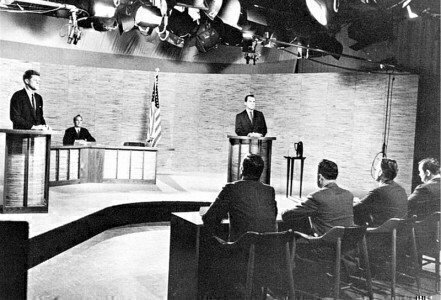Read the Excerpts From the Kennedy-nixon Debates.
September 26, 1960 is the twenty-four hours that inverse function of the modern political landscape, when a Vice President and a Senator took function in the start nationally televised presidential argue.
 The Vice President was Richard G. Nixon and the U.S. Senator was John F. Kennedy. Their first televised fence shifted how presidential campaigns were conducted, every bit the power of television took elections into American's living rooms.
The Vice President was Richard G. Nixon and the U.S. Senator was John F. Kennedy. Their first televised fence shifted how presidential campaigns were conducted, every bit the power of television took elections into American's living rooms.
The contend was watched live by 70 million Americans and it made politics an electronic spectator sport. It also gave many potential voters their outset risk to come across actual presidential candidates in a live surroundings, equally potential leaders.
The importance of the event can't be underestimated. Before 1960, at that place were candidates who debated (Abraham Lincoln and Stephen Douglas were 19th century examples) and at that place were candidates who appeared on television. And there were candidates who went out on the trail and "stumped" for votes, actualization in public at pre-bundled events or at whistle-stop tours on trains.
Simply near voters never had a chance to encounter candidates in a close, personal way, giving them the opportunity to form an stance almost the side by side president based on their looks, their voice and their opinions.
Going into the debate, Nixon was the favorite to win the election. He had been President Dwight Eisenhower's vice president for eight years. Nixon had shown his mastery of television receiver in his 1952 "Checkers" speech, where he used a televised address to debunk slush-fund allegations, and secure his vice presidential slot by talking about his pet dog, Checkers. Nixon had also bested Soviet leader Nikita Khrushchev in the famous Kitchen Contend.
Kennedy was the photogenic and energetic young senator from Massachusetts who ran a calculated primary entrada to all-time his master rival, Senator Lyndon Johnson. But Kennedy had argue experience in the primaries and said, "Nixon may take debated Khrushchev, merely I had to debate Hubert Humphrey."
The fence took place in Chicago and CBS assigned a 38-yr-old producer named Don Hewitt to manage the event. Hewitt went on to create "60 Minutes" for CBS. The highly promoted effect would pre-empt "The Andy Griffith Bear witness" and run for an 60 minutes. Hewitt had invited both candidates to a pre-production meeting, just only Kennedy took up the offering.
When Nixon arrived for the debate, he looked sick, having been recently hospitalized because of a articulatio genus injury. The vice president then re-injured his knee as he entered the TV station, and refused to call off the debate.
Nixon also refused to wear stage makeup, when Hewitt offered it. Kennedy had turned downwards the makeup offering first: He had spent weeks tanning on the entrada trail, but he had his own team practice his makeup just before the cameras went alive. The result was that Kennedy looked and sounded skilful on telly, while Nixon looked pale and tired, with a five o'clock shadow beard.
The next day, polls showed Kennedy had become the slight favorite in the general election, and he defeated Nixon past one of the narrowest margins in history that November. Before the debate, Nixon led past six percentage points in the national polls.
There were iii other debates betwixt Nixon and Kennedy that autumn, and a healthier Nixon was judged to accept won two of them, with the final argue a draw. However, the terminal iii debates were watched by 20 meg fewer people than the September 26thursday event.
In the backwash of the first fence, Nixon's running mate, Henry Cabot Gild, had a few choice words for the GOP presidential candidate. "That son-of-a-bitch simply lost us the election," Club reportedly said. Johnson, who was Kennedy's running mate, thought his running mate had lost the debate. Lodge saw the debate on Idiot box, while Johnson listened to the debate on the radio.
The event'due south aura of existence a game changer was so strong that in the following iii campaigns, the sitting president refused to debate any challenger. It was Gerald Ford in 1976 who established the current tradition of televised presidential debates in every general election.
Ford became the kickoff sitting president to take role in a televised argue. During his 2d contend with Jimmy Carter in San Francisco, President Ford said, "In that location is no Soviet domination of Eastern Europe." The gaffe was seen as a key factor in Carter'southward win over Ford.
Presidential debates became a fixture in 1980, subsequently the GOP challenger, Ronald Reagan, used a strong fence performance just a week before the election to win by a comfortable margin over Carter.
quinlivanlicninhat.blogspot.com
Source: https://constitutioncenter.org/blog/the-debate-that-changed-the-world-of-politics
0 Response to "Read the Excerpts From the Kennedy-nixon Debates."
Post a Comment